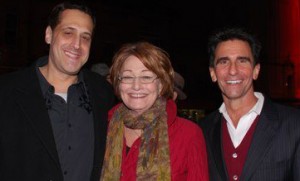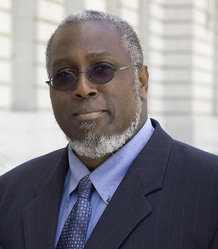Name: THERESA SPARKS
Age: OVER 55 and counting backwards
Occupation: DIRECTOR, SF HUMAN RIGHTS COMMISSION
District: DISTRICT 6
URL for website: www.sparksfor6.com
Neighborhood You Live In: CIVIC CENTER
Date Questionnaire Returned: SEPTEMBER 7, 2010
1. How often do you rely on Muni to get you around town? If not, what do you use instead? What would make it easier for you to choose Muni over other forms of transportation?
Even though I own a Prius, I use MUNI every day, in both my work and personal life.
I would use MUNI as my only form of transportation if it had greater dependability, more frequent buses and trains, better safety and more routes SOMA and Mission Bay.
2. What are the primary concerns of Muni’s owners (aka riders) about transportation and Muni in your District?
Dependability, safety, accessibility and on-time percentage are all issues in District 6. In certain areas, people do not ride the MUNI due to safety concerns. Also, better access for seniors and the disabled are concerns in D6. Service to Treasure Island is extremely lacking.
3. As a Supervisor, you will serve on the Board of the San Francisco County Transportation Authority. What is the role of the SFCTA, and what would you set as priorities for the agency in the next 4 years?
Dependability in funding, an increase in on-time rating and better safety would be my three top priorities. I would also look at replacing the remaining diesel powered buses with alternative energy vehicles.
4. Difficult decisions often have to be made regarding transportation in San Francisco. Sometimes a well-researched project may have loud, angry opponents, or a popular project may not be the best for City residents and for San Francisco’s transportation infrastructure.
How would you make a decision under these kinds of circumstances?
As president of the San Francisco Police Commission, I had to make these types of decisions nearly every week; vocal opposition, strong opinions and significant policy decisions relating to public safety. I made it a point to listen to all stakeholders, take the public meetings to the impacted areas, go to great pains to maintain full accountability and accessibility and involve everyone in the decision. Ultimately though, I made these tough decisions based on my best judgment of what was best for the people of this City. An example was during the search for a new Chief. I directed more than 49 public meetings around the City and sought input from all stakeholders and used that input as criteria to assess candidates for the position. Ultimately, the final selection, Chief George Gascon, was made based on those criteria.
(Feel free to cite a similar situation from your past experience as an example – it doesn’t have to be transit related)
5. What is the Fix Muni Now charter amendment? Do you support it? (Y/N) Why or why not?
YES, I do support it for a number of reasons. MUNI needs to save money to make improvements to service, improve safety and fund deferred maintenance costs. The Transportation Workers of America, the union representing MUNI workers refused to participate in City-wide cost reductions made by every other union in the City. Driver’s wages are set based on the economy of cities on the East Coast, our drivers wages are guaranteed to be always the second best wages in the country. Unusual work rules such as those for call-ins, sick outs and others result in highly inefficient service and unnecessarily high elevated costs. The TWA is the only union in San Francisco not subject to collective bargaining rules. For better service and equality with other unions we need to pass FIX Muni Now.
6. One (of many) causes for Muni’s perennial budget woes was the illegal seizure of state gas tax money by Governor Schwarzenegger and the Legislature. This has left a large hole in Muni’s income (as well as every transit agency in CA).
How would you make up this gap in Muni revenue?
We need to elect a Democrat as Governor of California to stop these illegal seizures of funds and pass the State proposition to allow the State budget to be enacted with a simple majority rather than 2/3 vote of the legislature. We need to pass FIX MUNI Now to help fund these deficits and service cuts. We also need to reduce costs in MUNI’s infrastructure not continue to raise fares.
Would you support a local funding source or sources (fees, taxes, or other type of revenue) to avoid future problems caused by the state?
I do support more local funding through re-prioritizing some of our existing general fund dollars for MUNI, and for public schools. We also need to look at using millions of dollars of existing development fees to help support our transportation infrastructure.
– would you achieve savings through cuts to Muni’s budget, fare increases, etc.
Cost savings at MUNI not fare increases.
– or, do you have other ideas on how to get Muni out of its annual financial woes?
We need to address and fix the structural imbalance of the City’s finances and budget. We cannot sustain year-after-year half billion dollar deficits. Multi-year financial planning with annual spending plans would give us an opportunity to assess both our long and short range needs and priorities including cost of government services, non-profits and infrastructure costs such as public transportation, public education and public health. MUNI would ultimately benefit from a cohesive financial structure allowing us a more comprehensive understanding of the costs of running this City.
7. Finally, tell us a story about a funny or unique experience you’ve had on Muni
I was riding the 30 Stockton one day, sitting across from an elderly woman who was with a very inquisitive and active pre-schooler, when I was asked a very odd question. The pre-schooler kept waving and smiling at me and, on one occasion, actually came across the aisle to say hello. The woman reached across and abruptly pulled the young man back towards her and asked if I rode the bus “to recruit children to my homosexual lifestyle? She then said I should be ashamed of myself.†I told her I wasn’t homosexual but straight. She said “Oh,sorry†and then let to child come over a sit next to me on the bench for the rest of the ride. Good thing I wasn’t a serial killer.




